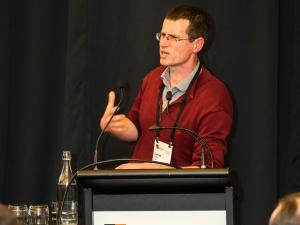Respiratory physician Lutz Beckert considers chronic obstructive pulmonary disease management, including the prevention of COPD, the importance of smoking cessation and pulmonary rehabilitation, and the lifesaving potential of addressing treatable traits. He also discusses the logic of inhaler therapy, moving from single therapy to dual and triple therapy when indicated, as well as other aspects of management
Targeting puffers and politicians
Targeting puffers and politicians

Prime territory for primary care to reduce its climate impact is to be found in the area of pharmaceuticals, says Christchurch specialist GP Dermot Coffey.
“[GPs] can focus on deprescribing, increasing patients’ pick-up of medications, and correct disposal,” says Dr Coffey, co-convenor of Ora Taiao – New Zealand Climate & Health Council.
He suggests aiming to prescribe only for the duration necessary, and analysing older patients’ medications to see which can be stopped.
The single biggest impact GPs can make to lowering their practices’ carbon footprint comes via asthma treatment. Dr Coffey has frequently made the call for prescribers to switch from metered-dose inhalers.
Last month’s inventory of New Zealand greenhouse gases shows 88 per cent of metered-dose inhalers sold in New Zealand contain a propellant that generates greenhouse gas emissions.
Each metered-dose inhaler of 200 puffs is equivalent to driving a Corolla for 500km, says Dr Coffey.
He points out the alternative, dry-powder inhalers, carries a CO2 cost that is less than 10 per cent of that for metered-dose inhalers.
He also suggests asking the local pharmacist whether they have signed up with a safe disposal system.
“It would be good to get a nationwide disposal system for all pharmacies…because studies show the metered-dose inhalers are on average half used when people think they’re empty. When they’re chucked in the bin, gas is released.”
Pharmac largely decides the range of medications general practice can prescribe from, with Ora Taiao and others calling for the agency to be required to consider carbon contribution in its funding decisions.
Dr Coffey says that primary care generates emissions via blood tests and radiology tests ordered, referrals made, and patients’ procedures carried out in other settings.
“Where possible, we should limit the tests we do,” he says.
He calls it a primary care physicians’ ethical obligation to advocate for changes beyond the consultation room. This can mean lobbying local politicians to provide more opportunities for walking and cycling, and to get rid of coal-burning.
Physical inactivity and air pollution are factors behind many illnesses and deaths, says Dr Coffey
The GP can also advocate for central government to do more to reduce poverty, which prevents many people from buying healthy foods that are lower in carbon emissions.
- Switch to dry-powder inhalers: this single action makes the biggest emissions impact on a general practice’s greenhouse gas emissions.
- Avoid back-pocket prescriptions (people don’t pick them up or use them).
- Examine your practice’s purchasing of single-use equipment; aim to reuse what can be reused.
- Insulation to reduce energy use should be paramount, where practical.
- Turn off lights when the building is empty; turn off computers whenever possible; shut down screens when leaving the room for more than 10 minutes; choose LED lightbulbs.
- Aim to go completely paper free; recycle as much paper as possible.
- Continue the shift to virtual care; when patients don’t have to travel, emissions are avoided.
- Reduce your personal travel.
- Divest from harmful environmental activities in your personal investments and superannuation.
Source: Dermot Coffey, Greening your general practice, a Goodfellow Unit podcast
We're publishing this article as a FREE READ so it is FREE to read and EASY to share more widely. Please support us and the hard work of our journalists by clicking here and subscribing to our publication and website







![Barbara Fountain, editor of New Zealand Doctor Rata Aotearoa, and Paul Hutchison, GP and senior medical clinician at Tāmaki Health [Image: Simon Maude]](/sites/default/files/styles/thumbnail_cropped_100/public/2025-03/Barbara%20Fountain%2C%20editor%20of%20New%20Zealand%20Doctor%20Rata%20Aotearoa%2C%20and%20Paul%20Hutchison%2C%20GP%20and%20senior%20medical%20clinician%20at%20T%C4%81maki%20Health%20CR%20Simon%20Maude.jpg?itok=-HbQ1EYA)
![Lori Peters, NP and advanced health improvement practitioner at Mahitahi Hauora, and Jasper Nacilla, NP at The Terrace Medical Centre in Wellington [Image: Simon Maude]](/sites/default/files/styles/thumbnail_cropped_100/public/2025-03/2.%20Lori%20Peters%2C%20NP%20and%20advanced%20HIP%20at%20Mahitahi%20Hauora%2C%20and%20Jasper%20Nacilla%2C%20NP%20at%20The%20Terrace%20Medical%20Centre%20in%20Wellington%20CR%20Simon%20Maude.jpg?itok=sUfbsSF1)
![Ministry of Social Development health and disability coordinator Liz Williams, regional health advisors Mary Mojel and Larah Takarangi, and health and disability coordinators Rebecca Staunton and Myint Than Htut [Image: Simon Maude]](/sites/default/files/styles/thumbnail_cropped_100/public/2025-03/3.%20Ministry%20of%20Social%20Development%27s%20Liz%20Williams%2C%20Mary%20Mojel%2C%20Larah%20Takarangi%2C%20Rebecca%20Staunton%20and%20Myint%20Than%20Htut%20CR%20Simon%20Maude.jpg?itok=9ceOujzC)
![Locum GP Helen Fisher, with Te Kuiti Medical Centre NP Bridget Woodney [Image: Simon Maude]](/sites/default/files/styles/thumbnail_cropped_100/public/2025-03/4.%20Locum%20GP%20Helen%20Fisher%2C%20with%20Te%20Kuiti%20Medical%20Centre%20NP%20Bridget%20Woodney%20CR%20Simon%20Maude.jpg?itok=TJeODetm)
![Ruby Faulkner, GPEP2, with David Small, GPEP3 from The Doctors Greenmeadows in Napier [Image: Simon Maude]](/sites/default/files/styles/thumbnail_cropped_100/public/2025-03/5.%20Ruby%20Faulkner%2C%20GPEP2%2C%20with%20David%20Small%2C%20GPEP3%20from%20The%20Doctors%20Greenmeadows%20in%20Napier%20CR%20Simon%20Maude.jpg?itok=B0u4wsIs)
![Rochelle Langton and Libby Thomas, marketing advisors at the Medical Protection Society [Image: Simon Maude]](/sites/default/files/styles/thumbnail_cropped_100/public/2025-03/6.%20Rochelle%20Langton%20and%20Libby%20Thomas%2C%20marketing%20advisors%20at%20the%20Medical%20Protection%20Society%20CR%20Simon%20Maude.jpg?itok=r52_Cf74)
![Specialist GP Lucy Gibberd, medical advisor at MPS, and Zara Bolam, urgent-care specialist at The Nest Health Centre in Inglewood [Image: Simon Maude]](/sites/default/files/styles/thumbnail_cropped_100/public/2025-03/7.%20Specialist%20GP%20Lucy%20Gibberd%2C%20medical%20advisor%20at%20MPS%2C%20and%20Zara%20Bolam%2C%20urgent-care%20specialist%20at%20The%20Nest%20Health%20Centre%20in%20Inglewood%20CR%20Simon%20Maude.jpg?itok=z8eVoBU3)
![Olivia Blackmore and Trudee Sharp, NPs at Gore Health Centre, and Gaylene Hastie, NP at Queenstown Medical Centre [Image: Simon Maude]](/sites/default/files/styles/thumbnail_cropped_100/public/2025-03/8.%20Olivia%20Blackmore%20and%20Trudee%20Sharp%2C%20NPs%20at%20Gore%20Health%20Centre%2C%20and%20Gaylene%20Hastie%2C%20NP%20at%20Queenstown%20Medical%20Centre%20CR%20Simon%20Maude.jpg?itok=Z6u9d0XH)
![Mary Toloa, specialist GP at Porirua and Union Community Health Service in Wellington, Mara Coler, clinical pharmacist at Tū Ora Compass Health, and Bhavna Mistry, specialist GP at Porirua and Union Community Health Service [Image: Simon Maude]](/sites/default/files/styles/thumbnail_cropped_100/public/2025-03/9.%20Mary%20Toloa%2C%20Porirua%20and%20Union%20Community%20Health%20Service%20in%20Wellington%2C%20Mara%20Coler%2C%20T%C5%AB%20Ora%20Compass%20Health%2C%20and%20Bhavna%20Mistry%2C%20PUCHS%20CR%20Simon%20Maude.jpg?itok=kpChr0cc)